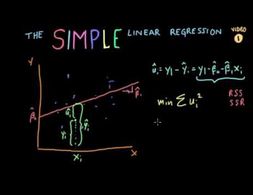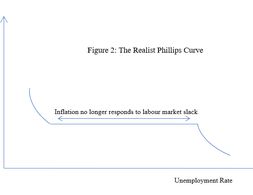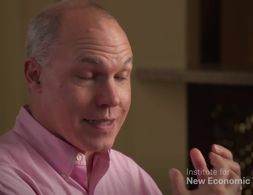✕
48 results
Richard Werner touches on a number of topics in this Odd Lots Podcast episode. As one of the pioneers when it comes to money and credit creation, he gives interesting insights into his early research on this topic. He then explains what he calls the “Quantity Theory of Credit” and is an alternative to the "Quantity Theory of Money".
First some terminology is explained. Then the interpretations of the coefficients and constants of the function are discussed. Afterwards the zero conditional mean assumption regarding the residual is problematized. Lastly, a graphical representation of a regression line is given and the least sum of squared errors is introduced and the equation for the coefficient of the linear function as well as for the intercept is given.
Understanding international trade is central to economics and is currently a hot political issue. It’s an area where popular perceptions of mainstream economics are low, since they have historically missed some important downsides of trade agreements, especially the hollowing out of former manufacturing hubs in the Western world. et economists have for long time had a theory of trade with an impressive amount of scientific clout behind it: the gravity trade model.
Mainstream inflation theories in economics do little to explain the recent acceleration in price increases. The associated economic policy recommendations further increase the misery of low-income groups.
What’s inflation? Why is it relevant? And is there an agreed theory about its roots and causes, or is it a contentious concept? That’s what this text is all about: We define what inflation actually means before we delve into the theoretical debate with an interdisciplinary and pluralist approach: What gives rise to it, what factors might influence it, and, consequently, what might be done about it?
Austrian economics focuses on the economic coordination of individuals in a market economy. Austrian economics emphasises individualism, subjectivism, laissez-faire politics, uncertainty and the role of the entrepreneur, amongst others.
The notion that the demand and supply side are independent is a key feature of textbook undergraduate economics and of modern macroeconomic models. Economic output is thought to be constrained by the productive capabilities of the economy - the ‘supply-side' - through technology, demographics and capital investment. In the short run a boost in demand may increase GDP and employment due to frictions such as sticky wages, but over the long-term successive rises in demand without corresponding improvements on the supply side can only create inflation as the economy reaches capacity. In this post I will explore the alternative idea of demand-led growth, where an increase in demand can translate into long-run supply side gains. This theory is most commonly associated with post-Keynesian economics, though it has been increasingly recognised in the mainstream literature.
In the history of the social sciences, few individuals have exerted as much influence as has Jeremy Bentham. His attempt to become “the Newton of morals” has left a marked impression upon the methodology and form of analysis that social sciences like economics and political science have chosen as modus operandi.
This course is designed to provide students with an understanding of work-related gender issues and to enable students to analyze the issues using the tools of economics.
Towards a post-work future: a necessary agenda to reconcile feminist & ecological concerns with work
In this essay the author outlines the basis for embracing a post-work agenda, rooted in an emancipatory potential from the domination of waged work, which could help answer both feminist and ecological concerns with work.
Modern Monetary Theory (MMT) is a school of monetary and macroeconomic thought that focuses on the analysis of the monetary and credit system, and in particular on the question of credit creation by the state.
Michael Kalecki famously remarked “I have found out what economics is; it is the science of confusing stocks with flows”. Stock-Flow Consistent (SFC) models were developed precisely to address this kind of confusion. The basic intuition of SFC models is that the economy is built up as a set of intersecting balance sheets, where transactions between entities are called flows and the value of the assets/liabilities they hold are called stocks. Wages are a flow; bank deposits are a stock, and confusing the two directly is a category error. In this edition of the pluralist showcase I will first describe the logic of SFC models – which is worth exploring in depth – before discussing empirical calibration and applications of the models. Warning that there is a little more maths in this post than usual (i.e. some), but you should be able to skip those parts and still easily get the picture.
The article pursues the two related questions of how economists pretend to know and why they want to know at all. It is argued that both the economic form of knowledge and the motivation of knowing have undergone a fundamental change during the course of the 20th century. The knowledge of important contemporary economic textbooks has little in common with an objective, decidedly scientifically motivated knowledge. Rather, their contents and forms follow a productive end, aiming at the subjectivity of their readers.
From the two premises that (1) economies are complex systems and (2) the accumulation of knowledge about reality is desirable, I derive the conclusion that pluralism with regard to economic research programs is a more viable position to hold than monism. To substantiate this claim an epistemological framework of how scholars study their objects of inquiry and relate their models to reality is discussed. Furthermore, it is argued that given the current institutions of our scientific system, economics self-organizes towards a state of scientific unity. Since such a state is epistemologically inferior to a state of plurality, critical intervention is desirable.
From the perspective of mainstream theory the effectiveness of monetary policy in bringing down inflation depends on two very important equations the aggregate demand equation and the infamous Phillips Curve Without these it becomes more difficult or rather impossible for central banks to carry out monetary policy and obtain the …
This text provides an easy to understand introduction to complexity economics for non-specialist audiences such as bachelor's students.
Post-Keynesians focus on the analysis of capitalist economies, perceived as highly productive, but unstable and conflictive systems. Economic activity is determined by effective demand, which is typically insufficient to generate full employment and full utilisation of capacity.
A historical glimpse of how economists of the 19th century debated the usefulness of mathematics to economics
A review of:
[1] Intermediate Microeconomics, H.R. Varian
[2] Mikrooekonomie, R.S. Pindyck, D.L. Rubinfeld
[3] Grundzuege der mikrooekonomischen Theorie, J. Schumann, U. Meyer, W. Stroebele
Due to the economic crisis of 2008/2009, households faced drastic decreases in their incomes, the availability of jobs. Additionally, the structure of the labour market changed, while austerity measures and public spending cuts left households with less support and safeguards provided by the state. How have these developments affected the burden of unpaid labour and what influence did this have on gender relations?
This article, looks at the complex interaction between an urban economy and the vegetation within that urban area. In summary, numerous studies have found a positive link between increased vegetation and social as well as personal health. It makes a case for increasing urban vegetation as a way to benefit local economies.
In this essay the author elaborates on the EU's perspective on the fast growing sector of the platform economy.
Approaching the law of nature that determines all forms of economy. The bulk of economic theory addresses the economic process by setting out on a catalogue of aspects, seeking the laws in the aspects and hoping to get together a reliable view of the whole.
In this essay the authors take a look at how welfare could be provided in a degrowth society.
The novel coronavirus (Covid-19) is rapidly spreading around the world. The real economy is simultaneously hit by a supply shock and a demand shock by the spread of coronavirus. Such a twin shock is a rare phenomenon in recent economic history.
Exploring Economics, an open-source e-learning platform, giving you the opportunity to discover & study a variety of economic theories, topics, and methods.
Firms are the primary places where economic activity takes place in modern capitalist economies: they are where most stuff is produced; where many of us spend 40 hours a week; and where big decisions are made about how to allocate resources. Establishing how they work is hugely important because it helps us to understand patterns of production and consumption, including how firms will react to changes in economic conditions and policy. And a well-established literature – led by post-Keynesians and institutionalists – holds that the best way to determine how firms work is to…wait for it...ask firms how they work. This a clearly sensible proposition that is contested in economics for some reason, but we’ll ignore the controversy here and just explore the theory that springs from this approach.
Professor Joseph Aldy from Harvard Kennedy School gives us some insights about how economics can set the balance between policymakers, scientists, employers and citizens.
The last 15 years have seen extensive research into ecosystem service valuation (ESV), spurred by the Millenium Ecosystem Assessment in 2005 (Baveye, Baveye & Gowdy, 2016). Ecosystem services are defined as “the benefits people obtain from ecosystems” (Millenium Ecosystem Assessment, p.V). For example, ecosystems provide the service of sequestering carbon which helps regulate the climate. Valuation means giving ecosystems or their services a monetary price, for example researchers have estimated that the carbon sequestration services of the Mediterranean Sea is between 100 and 1500 million euros per year. The idea of ESV was a response to the overuse of natural resources and degradation of ecosystems, allegedly due to their undervaluation and exclusion from the monetary economy. ESV can be used (1) for policy decision-making, for example allocating funding to a reforestation project (2) for setting payments to people who increase ecosystem services, for example a farmer increasing the organic carbon content of their soil, and (3) for determining fees for people who degrade ecosystem services, for example a company that causes deforestation.
The objective of the course is to explore the main strengths and weaknesses of orthodox and heterodox paradigms within development economics.
Recovery from the Covid-19 crisis provides a chance to implement economic measures that are also beneficial from environmental and social perspectives. While ‘green’ recovery packages are crucial to support economies tracking a low-carbon transition in the short-term, green measures such as carbon pricing are also key to improving welfare in the long-term. This commentary specifies the need for carbon pricing, outlines its implications for our everyday lives, and explains how it works alongside value-based change in the context of climate action and societal well-being.
This book is about history of monetary economic thought. From the 18th century with Hume and Smith to the early 20th, the author explains the different schools of thought regarding the monetary theories and policies and specially the central banking theory.
We use cookies on our website. Click on Accept to help us to make Exploring Economics constantly better!































